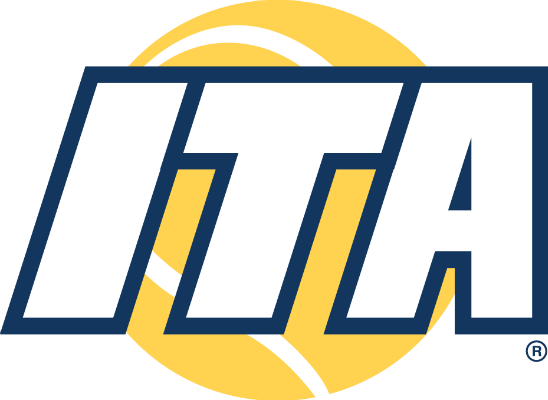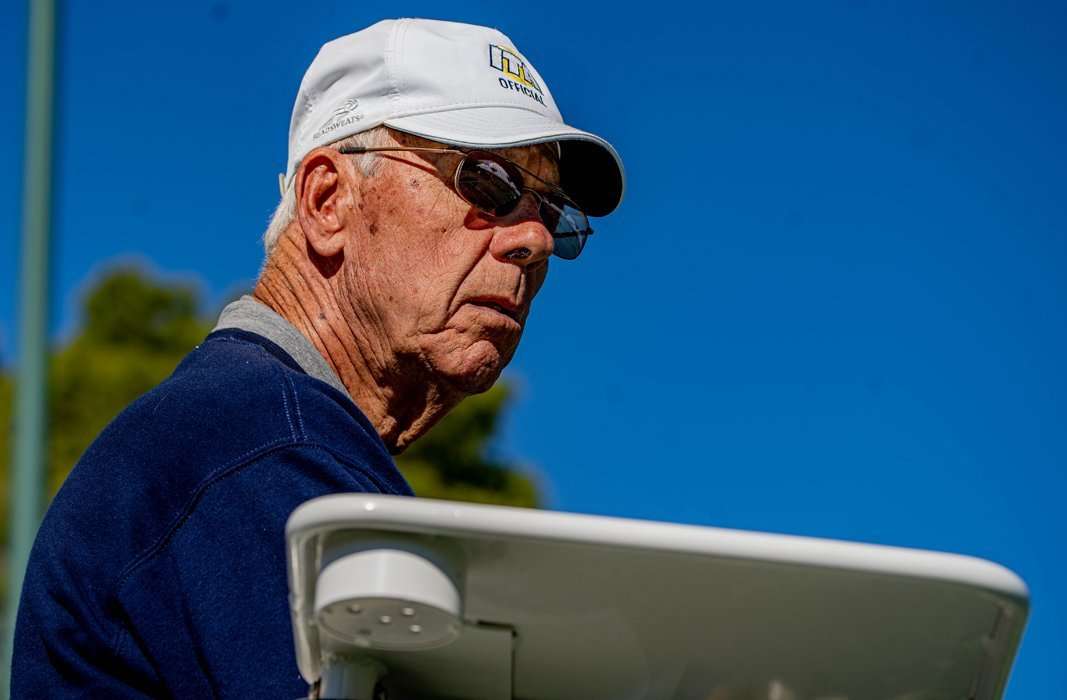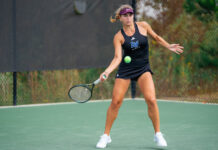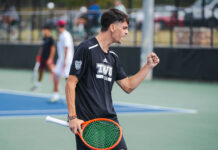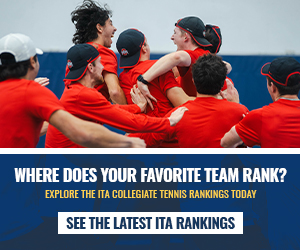Note: This information is a summary. Interested parties should consult 2020-2021 ITA Rulebook for official rule language. The 2020-21 ITA Rulebook is scheduled to be published electronically and in hard copy in early August 2020.
ITA Rules Committee Members (in alphabetical order):
- Mark Booras (Tulane University – DI)
- Bev Buckley (Rollins College – DII)
- Rebel Good (Official)
- Jose Martinez (Warner University – NAIA)
- Sheila McInerney (Arizona State University – DI)
- Anthony Montero (Official)
- Jeff Northam (Whitman College – DIII)
- Dale White (Abraham Baldwin Agricultural College – JUCO)
Rules Additions, Changes & Clarifications for All Divisions
- Elimination of Verbal Appeal: Collegiate tennis is now analogous to a USTA match in terms of overrules; there will no longer be a verbal appeal, except in the case of a first serve fault that is played as good by the receiver. All overrules shall be made immediately by an official in direct observation of the court. A player who continuously questions an official about line call may be penalized under the ITA Point Penalty System. Players who have been overruled more than twice will be penalized under the ITA Point Penalty System for each subsequent overrule. (Additional Information Available)
- Note: New rule aligns ITA with the USTA in regard to the handling of overrules and is designed, at least in part, to eliminate use of the verbal appeal as an act of gamesmanship aimed at the opposing player and/or as an effort to manipulate officials. The elimination of the verbal appeal only gives officials the ability to overrule erroneous “out” and/or “let” calls made by a player. They may not call balls “out” for the player or “correct” a ball called as good. The ITA piloted “no verbal appeal” at the 2019 Oracle ITA Masters, the 2020 ITA Kickoff Weekend and the 2020 ITA Division I Men’s and Women’s National Team Indoor Championships. These pilots covered 170 DI dual matches and involved 122 DI men’s and women’s tennis programs. ITA office currently working with ITA Officials department on providing coaches with additional webinar training concerning the application of this rule. More information to follow.
- Designated Player Assistants: Players not playing in a segment of a dual match may be “Designated Player Assistants” (DPAs). These DPAs can assist players on court but are not treated the same as coaches. (Additional Information Available)
- Note: Language is now consistent with NCAA Bylaws.
- Lineup Changes Once a Match has Begun: The Referee shall be responsible for collecting lineup changes from both coaches as well as communicating those changes to the opposing coaches. Lineup changes must be made within two minutes of the completion of doubles (or within two minutes of singles, if singles was played first). No additional time beyond 5 minutes will be given to any player if there is a lineup change.
- Note: Revised rule is a return to the previous rule that requires the referee to collect and communicate lineup changes between doubles and singles. During un-officiated matches, coaches will still be responsible for managing this process.
- Match Protests Concerning Two Schools from the Same Conference: If the match is does not count toward conference competition, the conference office has the option to send the match protest to the ITA for handling of the protest.
- Determining Outdoor Playable Conditions: It was clarified that the window for determining playable outdoor weather conditions shall be from the scheduled start time of the match.
- Inclement Weather: Specific time frames have been established when dealing with inclement weather or darkness.
- With indoor backup: The decision to move indoors must be made within one hour of the suspension of play. Play shall resume, indoors or outdoors, within one hour.
- Without indoor backup: Teams shall wait a minimum of two hours from the scheduled match start time before making a decision to cancel or postpone the match if conditions are forecast to improve. When a match in progress is suspended, teams shall wait a minimum of two hours to resume play before making the decision to cancel or postpone a match.
- Bleeding Timeout: If a player has already received a BTO for an injury and begins bleeding again from that same area later in the match, the player may use the Point Penalty System to try and stop the bleeding for a second time. The PPS may not be used immediately following a 15-minute bleeding timeout (if the bleeding is not stopped after 15 minutes, the player must retire).
- Noisemakers: It has been clarified that noisemakers (defined as musical instruments, thundersticks, megaphones, air horns or anything that amplifies sound) shall not be used during play.
- Lack of Athletic Trainer: If a school will not have a certified athletic trainer (ATC) available for a dual match, the visiting coach shall be notified in advance. Failure to not have an ATC for a match and without prior notification shall be reported to the ITA office.
- Heat Rule: The heat rule shall be reevaluated by the Referee at the resumption of a suspended match.
- Video Review: The use of PlayFair shall be specified in match contracts. An off-court Referee may also act as a Video Review Official (VRO). If video review technology is not functioning on one or more courts at the start of the match, the system shall not be utilized unless both coaches agree otherwise. If video review technology becomes unavailable at any time during a match in progress, video review shall still be used on the remaining courts where the technology is working properly.
Rules Additions, Changes & Clarifications for Division I Men
- Men’s Division I Medical Timeout: Division I Men shall receive up to five minutes for a Medical Timeout, with up to three minutes for treatment. This aligns all divisions to the same MTO timing parameters. Division I Men will still be assessed a point penalty for taking an MTO.
Rules Additions, Changes & Clarifications for Junior/Community Colleges
- JUCO Warm-up: JUCO is eliminating the warm-up between opponents for doubles and singles on matches played on 6 courts. This aligns all divisions under the same warm-up rule in dual matches. (No warm-up between opponents for doubles or singles.)
Overrules
- Overrule must be immediate. The responsibility to make an initial line call remains the responsibility of the player. An official in direct observation of a court shall immediately overrule a player’s erroneous “out” and/or “let” calls. The official shall overrule the call only if absolutely certain the call was erroneous. A player shall not directly verbally appeal an opponent’s call to an official except in the case of a first serve fault that is played by the receiver. A player who excessively questions an official about an opponent’s line calls may be penalized under the ITA Point Penalty System.
- First serve. The server (or server’s partner in doubles) may make a volley or half-volley of a returned first serve and then immediately stop play and verbally appeal to an official in direct observation of the court if the serve was out. If the server (or server’s partner in doubles) remains in the back court, the player must stop play before attempting to return the ball. If the official confirms the serve is in, the server loses the point. If the official determines the serve is a fault, the server shall play a second serve and the receiver shall not be penalized with an overrule.
- A player who has been overruled more than twice shall be penalized under the ITA Point Penalty System. If an official has overruled a player or doubles team twice, the official shall penalize each subsequent overrule under the ITA Point Penalty System.
- Overrule of service let call. If an official in direct observation of a court overrules a service let call (excluding Division I, Division II and NAIA men), the player/team making the let call loses the point. This overrule shall count toward the progressive number of overrules for the match.
- Overrule of out call on let serve. If a serve that strikes the net (excluding Division I, II or NAIA men) is called out and overruled, the server is entitled to replay that serve. The overrule counts toward the progressive number of overrules allowed per match.
- Procedure with additional officials on court. When a match has one or more line umpires in addition to a chair umpire, and those additional line umpires are not making calls directly, the Chair Umpire may consult the line umpire before confirming or overruling the call.

